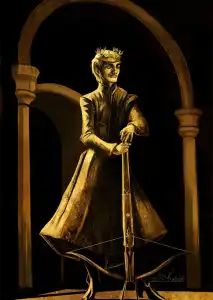Chapter 429: The Tsar's Devious Scheme |
There are still many smart people in this world. After the Habsburgs abandoned their bid for the Polish throne, several other European royal families also withdrew.
This includes House Bonaparte. Napoleon III wisely gave up on the Polish quagmire. Although he wanted to support Poland to keep Austria in check, Napoleon III did not believe Poland could succeed.
Whether this had anything to do with the Poles looking down on them is unknown. In any case, in this era, House Bonaparte was still an upstart and would normally not have the qualifications to be a candidate.
Wouldn’t it be embarrassing if they were somehow included in Poland’s shortlist? Given the Poles’ ability to court disaster, it wouldn’t be surprising if this happened.
Another strong contender, the House of Saxe-Coburg and Gotha, also withdrew. Poland’s poor strategic position deterred them.
The so-called elective monarchy system in Europe was always a game of power struggles involving political and diplomatic maneuvers. It also depended on whether the candidates themselves were willing; there were plenty of people who did not wish to become kings.
Now, all the major European powers had their own favored candidates, making the situation even more chaotic.
Prussia supported William I as the King of Poland, but after facing opposition from France and Austria, they then backed Karl of House Hohenzollern-Sigmaringen, only to face the same opposition.
Spain and Austria supported the House of Bourbon for the Polish throne, but this met strong resistance from France and Prussia.
It’s worth mentioning that Austria also supported George for the Polish throne. There’s no contradiction here; no one said you could only support one candidate.
In any case, the goal was to create trouble for Prussia. As long as it wasn’t William I, Franz didn’t care who became the King of Poland.
Prussia and Poland together would be more than just the sum of their parts. If they integrated their resources, they would become a major European power.
For the security of their northern borders, Franz naturally wouldn’t let them merge easily. For Austria, having Prussia and Poland join forces against the Russian Empire was enough. Letting them merge would be asking for trouble.
Just as in the original timeline where Germany didn’t dare to annex Austria-Hungary, Franz wouldn’t dare to annex the Prussian-Polish federation, for it was practically a ticking time bomb.
The great powers had different positions, leaving the Polish parliament in a dilemma, completely unsure of whom to choose.
The Polish people couldn’t empathize with the parliament’s troubles. They were exercising their freedom, holding up signs, chanting slogans, and marching in the streets, surrounding the parliament building.
If you listened carefully, you could hear shouts of “George,” “William,” “Karl”...
Indeed, the citizens concerned about the fate of the Polish crown were making their voices heard.
How many were sincere and how many were just brought in to make up numbers was up for interpretation.
The newly established Polish parliament had never seen such a spectacle. In the past, they had organized people to shout outside. Now, the tables had turned, and they were the ones being shouted at.
The Tsar was not to be trifled with. In the past when they chanted slogans, they did so with trepidation, unlike the arrogance of those outside now, directly surrounding the parliament and forcing them to make a decision.
“Send someone out to ask what they actually want. Damn it, did I just hear ‘Napoleon’? Do they want a dead man to be the King of Poland?” Speaker Alex shouted in rage, nearly driven mad. If choosing a king were so easy, why would they be agonizing over it?
It is easy to share hardship, but difficult to share prosperity.
When they were fighting to establish the country, they had a common enemy, the Russians, and everyone could cooperate closely. Now that Poland had become independent, the various factions began to vie for power and profit.
The protesting crowd outside was organized by the losers in this power struggle. Their purpose was obvious: to use political maneuvering by supporting a king to make a comeback.
In reality, the republican faction within the government was also significant. They were just afraid of intervention from other European countries and didn’t dare to adopt a republican system.
The Polish parliament’s prolonged inability to make a decision was largely due to the republicans. They disrupted votes and delayed decision-making, preparing to establish a de facto republic.
Once the government institutions stabilized, creating a fait accompli, even if a king were chosen later, he would be merely a figurehead.
No one wanted an additional shackle on themselves, so the leaders of the provisional government were all working to sideline the king. However, the protests outside had disrupted many of their plans.
...
On November 11, 1867, the shocking “11/11” massacre occurred in Poland. The situation of the protest march quickly spiraled out of control under insidious guidance, leading to an assault on the parliament building.
By the time the police belatedly arrived to disperse the crowd, 17 members of parliament had already been killed on the spot in the chaos, and dozens more, including Speaker Alex, were injured.
With such a major incident, the Polish government naturally couldn’t let it go. White terror enveloped the streets of Warsaw.
The black hand behind the scenes was never found, but those who participated in the protests filled the prisons. No matter how they tried to make amends, the Polish parliament had lost its authority because of this.
When the news reached Vienna, Franz merely smiled. Such an obvious situation needed no discussion. Suppressing protests was common; having the parliament building stormed by a crowd was nothing new, but killing so many parliamentarians was a first.
In a place like parliament, if it was attacked by protesters, how could the police be late? Such a simple issue didn’t require much discussion.
Under normal circumstances, as soon as it was discovered that the protesters were heading towards the parliament building, even if the police didn’t intercept them, they should have deployed a large number of officers to protect the parliament.
Undoubtedly, this was the result of internal power struggles. The parliament’s dignity was swept away, and the government’s power was naturally strengthened.
It also provided an opportunity to strike at competitors. Any revolutionary group involved in organizing the protest would be in deep trouble.
While protests and demonstrations could be seen as exercising citizens’ rights, storming the parliament and killing members of parliament was an act of terrorism.
The only winner seemed to be the current Polish government. But then again, they might not be the winners either; they could very well be pawns being used by others.
In Franz’s view, the Prussians were likely behind this conspiracy. The Polish government appeared to have gained significant power, but in reality, they were in a precarious position.
The rules of internal power struggles in the country had been broken, which was not good for the Polish government. The government was both the rule maker and the rule enforcer.
Now that someone had broken the unwritten rules, others were clearly not going to continue following them. The political struggle had crossed the line into physical violence, meaning everyone had to be prepared for assassination in the future.
The foundation of the Polish government’s rule was shaken. To stabilize the domestic situation, they would inevitably rely on Prussian support. Consequently, the Kingdom of Prussia’s influence in Poland was sure to increase.
If Franz didn’t want to get involved in this mess, Austria could step in now and potentially outmaneuver Prussia.
However, this kind of infiltration was useless for Austria. No matter how tempting the Kingdom of Poland might be, Franz had no appetite for it now. A delicacy that could only be looked at but not eaten was better abandoned altogether.
...
In the Berlin Palace, William I was also pondering the true culprit behind the incident. He didn’t believe that the high-level officials of the Polish government would be so foolish as to break the unwritten rules for a temporary advantage.
William I asked, “Prime Minister, who do you think is most likely to have orchestrated this?”
The art of war is deception, so asking Moltke to answer this question was quite fitting. It wasn’t an intentional challenge; William I was not that petty.
Moltke analyzed, “Your Majesty, I believe the Polish government is likely innocent. Based on the current international situation, I think the Austrians are the most suspicious. Looking at the last two European wars, they have been the victors.
Creating incidents, provoking international relations, and creating international conflicts are specialties of the British and the Austrians. The British need us and the Poles to join forces against Russia and Austria, so they have no reason to act at this time.
Austria, on the other hand, only needs us and Poland to unite against Russia; they do not want to see our two countries merge. Creating a bit of discord between us and Poland is quite necessary for them.
Of course, the French and the Russians are also suspects. However, they are too far from Poland and their influence is limited, making it difficult for them to plan this.
As for the Russians, given the deep-seated conflict between Russia and Poland, even if the Russian government wanted to cause trouble, the Poles might not be willing to cooperate with them.”
This answer sounded reasonable, but William I still felt something was off; it didn’t quite seem like the modus operandi of the Austrian government.
Austria also had a significant influence on Poland. Among the volunteers who had initially joined the Polish independence movement, there were numerous Austrian spies.
These seemingly inconspicuous individuals actually held quite a few important positions within the Polish government. There were many ways to sow discord between the two countries without resorting to such extreme measures.
If things were exposed, the international repercussions would be significant. While William I had his suspicions, he didn’t voice them. Letting Austria take the blame was fine by him.
Without evidence, it didn’t really matter whether Austria was behind it or not; after all, the Poles didn’t have the capability to retaliate.
Franz had no idea that a hefty accusation had just suddenly fallen from the sky right toward him. Franz believed it was a Prussian conspiracy, while the Prussians thought Austria was trying to drive a wedge between them and Poland.
...
In St. Petersburg, Alexander II was listening to his subordinates’ reports. If the contents were leaked, they would undoubtedly shock the entire European continent.
Based on the principle of who benefits the most, the Polish government and Prussia became the prime suspects. Who would think that the seemingly unrelated Russia was behind it?
By now, the Polish government had probably blamed Prussia for the incident. Even if they couldn’t do without Prussian support in the short term, their relationship would still be shadowed by suspicion.
No one likes an ally who interferes in their domestic affairs. Once the issue of the Polish king is stabilized, the relationship between Prussia and Poland is bound to change.
This was not just a conspiracy but also an open plot. Without evidence, the Prussians couldn’t clear their name.
Even if they managed to prove their innocence, could the Prussian-Polish relationship return to its original state? Obviously not, unless the Prussian government gave up the opportunity to infiltrate Poland.
Alexander II had merely provided an excuse for conflict between the two countries. There were too many potential conflicts of interest between Prussia and Poland. As long as they could not become a unified whole, contradictions were bound to arise.
If Austria took the blame, Alexander II’s scheme would be even more perfect. If both Prussia and Poland had deteriorating relations with Austria, it meant that in future wars, Russia would have an additional ally.
The experience of fighting alone was not pleasant, and Alexander II didn’t want to do it all over again.
It was a lesson he learned the hard way.
After this lesson, Alexander II understood the importance of allies. His earlier policy of “favoring Prussia and alienating Austria” now seemed like a joke.
Making foreign policy decisions based solely on personal preferences is utterly foolish.
Unlike established empires, the Kingdom of Prussia needed to expand to become strong. At the time, they couldn’t defeat the three surrounding large empires and ultimately chose to target the Russian Empire.
This wasn’t because Russia was weak, but because Russia had no allies. Additionally, attacking Russia could gain them the friendship of Britain and France, alleviating concerns about financial and logistical support.
Transportation was also a crucial factor. Both France and Austria had complete railway networks. As Prussia was the first to recognize the importance of railways in warfare, they had assessed the situation before starting the conflict.
France and Austria could deploy too many troops, potentially overwhelming Prussia in one go. Thus, they chose to fight the Russian Empire, which could only deploy a limited amount of troops.
Regardless of the reasons, the primary factor was Russia’s isolation. No matter the justification, attacking Russia was seen as righteous by other European countries.
Attacking other countries would easily draw hostility. Before Russia joined the war, Prussia’s invasion of Denmark was condemned by various European nations, with many calling for international sanctions.
However, once the Russian government entered the war, the situation changed instantly. While condemning Prussia’s invasion of Poland, they simultaneously supported Prussia’s conflict with Russia.
Russia’s only significant ally, Austria, had distanced itself since Alexander II’s ascension. Diplomatic changes directly impacted the war, with Austria’s support diminishing significantly compared to the Near East War.
After summarizing the lessons learned, Alexander II also began to prioritize diplomacy, with the effort to divide Prussian-Polish relations being just one aspect.

















